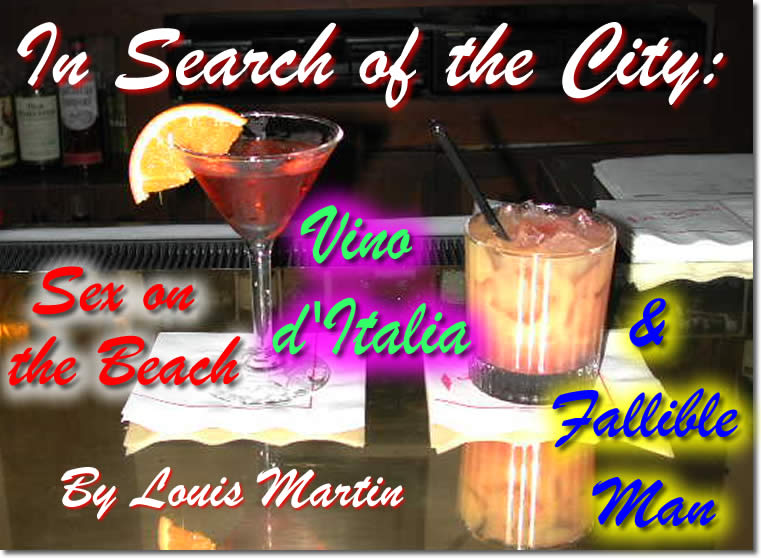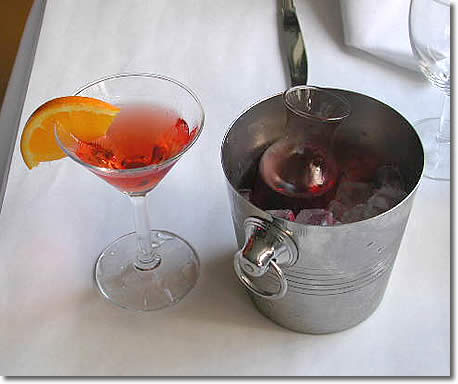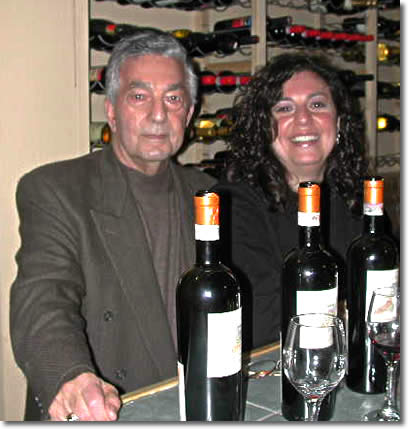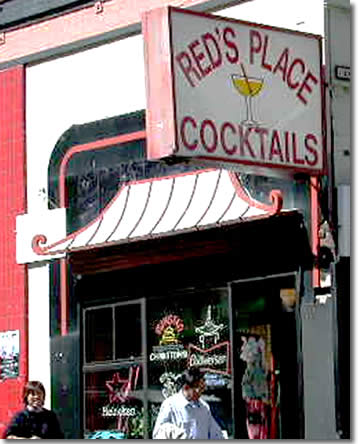Home | City Notes | Restaurant Guide | Galleries | Site Map | Search | Contact

My friend Xiao Fan and I are having lunch downtown at Le Central on Bush Street. It is about two in the afternoon and the business lunch crowd is now thinning out. We have the table by the window. I like to call it the Mayor's table, because whenever Mayor Willie Brown is there, he gets it. I tell Xiao Fan this.
"If he were here today," I say, "we would be over there." I point to the back of the restaurant toward the restrooms. She laughs. She knows how things are.
But the Mayor is not here today, so there we are in that nice window spot where you can look out on Bush Street and the old brick buildings on the other side. I don't know why I like those old brick buildings but I do. They make me feel young, glamorous, or something I'm not.
Louis is over to take cocktail orders, and Xiao Fan surprises me. "Can you do Sex on the Beach?" asks Xiao Fan. Louis raises his eyebrows just a little and says he'll check. I don't know what interests Xiao Fan about this drink other than saying its name. Her English is limited, but she says "Sex on the Beach" like a horny young guy with a surfboard. I suspect she's been practicing saying it.
I order a Negroni and Louis goes off. Since he doesn't return right away, I guess Toni, the solid backbone of the bar at Le Central, has said she can do it; or let us say make it, or let us try that again ... Well, you know what I mean. She's a highly capable bartender. In fact, one of the best in a city that takes drinking, and some say little else, seriously.
We seem to be in a laughing mood despite the weather, which is overcast. In San Francisco we know it is spring even when it is pouring rain and blasting wind and our hearts our broken.
 A
few minutes later Louis is back with Sex on the Beach and my Negroni (top
photo, right and left, respectively). So there we are having Sex on the
Beach at the window table at Le Central restaurant in downtown San Francisco.
Or rather Xiao Fan is having Sex on the Beach and I am doing just fine
with my pretty little Negroni.
A
few minutes later Louis is back with Sex on the Beach and my Negroni (top
photo, right and left, respectively). So there we are having Sex on the
Beach at the window table at Le Central restaurant in downtown San Francisco.
Or rather Xiao Fan is having Sex on the Beach and I am doing just fine
with my pretty little Negroni.
It is tax day, April 15th, and we get onto the subject of the IRS. I tell her about the time the government went after me for removing the furniture of one of my clients.
"You take furniture?" she says, looking a little shocked that I would do such a thing.
"No," I say, "but the government said I did."
Xiao Fan stares at me, waiting for an explanation and forgetting all about Sex on the Beach.
"It was this way," I say, launching darkly into my story. "I was doing some freelance writing for one of those dot-com companies during the dot-com bubble days. Yes, there was so much money floating around then that even I thought that I should have some of it. That was just before the turn of the century, and you know how it was back then. Greed was everywhere and the younger generation was the worst. Raw youth thought it had invented everything: sex, fast cars, booze, good times, and even, probably, itself. Young people, like prostitutes, stood on corners and in front of trendy restaurants shouting orders on cell phones to clueless older people and took credit for everything, other than the impending crash. Only for my client the bubble was bursting prematurely. They were going slowly, quietly bankrupt, while for others the bubble was still in the expanding stage. Now when my client actually went bankrupt, they apparently owed taxes. And so the government applied an old law that said you can't come in and take away the furniture of someone who owes you money. Back in the 'good ol' days' that was done pretty often, and come to think of it, that probably makes sense. But you see I had not taken their furniture or anything they had. I had simply been paid by them for work performed. But according to the government bankruptcy lawyers, my being paid was the same thing as taking the furniture; and they were demanding that I give the money back, mainly, I believe, so that it, the government, could get its tax money."
Xiao Fan looks at me across the table with an astounded look on her face. "But that's not right," she blurts out with the look on her face of someone too innocent to be having Sex on the Beach.
"Right or not, that is what they demanded," I said. "Naturally I turned this over to my lawyer. But my lawyer said it was hopeless. I would have to pay the government what I had earned in the last three months of working for the client—the period in which I had been 'removing the client's furniture'—or the government would come in and remove 'my furniture.'"
"You must be very, how you say, angry," said Xiao Fan.
She does not use the past tense. And I have quit using it around her as much as possible. We understand each other quicker that way.
"Yes," I said, "I am very angry. At least for awhile until I realize my case is hopeless. My lawyer assures me it would cost me more in lawyer fees to fight this than it would to just pay up. So in the end I pay up. I 'give 'em back their furniture.'"
 I
took a little sip of my Negroni now. Toni does this drink beautifully.
It even comes in a little champagne bucket to keep it cold. If you don't
know the Negroni, let me tell you: it is made with bitters, and bitters
are the ingredient that fits this story and many other I know. Sometime
I would love to order a sweet Lillet but I have no stories to go with
that drink.
I
took a little sip of my Negroni now. Toni does this drink beautifully.
It even comes in a little champagne bucket to keep it cold. If you don't
know the Negroni, let me tell you: it is made with bitters, and bitters
are the ingredient that fits this story and many other I know. Sometime
I would love to order a sweet Lillet but I have no stories to go with
that drink.
"So," I said very seriously now, "that is how it was back in the days when I was a furniture thief. Watch your sofa, that nice writing table, when I'm around."
We both had a good laugh. That is the nice thing about most bad things in life. Someday you get to laugh about them. That is the nature of humor. But it is sad that you often have to wait a very long time before you get to laugh. I finished my Negroni and ordered another. Xiao Fan's Sex on the Beach lay half drunk on the table.
After lunch, on the way out and a little jiuzuide, I asked Toni about Sex on the Beach.
"I got on the phone and called Jeff," she said. Jeff is her husband. "He got on the Internet and looked it up. I was missing only one thing, the Peach Schnapps." Toni said she substituted for that. She makes all the common drinks and a lot of less-common ones. But Sex on the Beach is not one that the bankers and financial folks who hang out at Le Central order.
I still don't know what got into Xiao Fan ordering this wordy, slinky-sounding mouthful of a drink. Is she trying to tell me something? And did I mention the lovely assortment of spring flowers on the table? Now that is sexy.
But let's get serious about booze.
And if we're going to get serious about booze, we're going to have to
quit calling it booze.
"How do you taste wine?"
I ask Lawrence Romano (photo right with daughter Nancy) of Wine Appellations.
He is doing a wine tasting at Molinari's, that deli magnifico over on Columbus in North Beach. Romano
is part of the reason for the marvelous assortment of wines at Molinari's.
He is one of their wine distributors. He has been around the wine business
for years and has worked for Robert Mondavi, Beaulieu Vineyards, Louis
Roederer and others. His current company, Wine Appellations, deals only
in limited productions in Italy and California.
Molinari's, that deli magnifico over on Columbus in North Beach. Romano
is part of the reason for the marvelous assortment of wines at Molinari's.
He is one of their wine distributors. He has been around the wine business
for years and has worked for Robert Mondavi, Beaulieu Vineyards, Louis
Roederer and others. His current company, Wine Appellations, deals only
in limited productions in Italy and California.
I'm curious about this tasting question because I have recently been talking with Lorenzo Petroni, who owns North Beach Restaurant and also Petroni Vineyards. Lorenzo told me how his grandfather taught him to take a little sip and let it sit down below the tongue. My French grandmother, a feisty woman who was always stirring up trouble and pretty nearly drove my grandfather nuts, taught me another technique. You take not a whole mouthful but nevertheless a goodly sip; then you inhale air through it. This causes percolation and the bouquet goes right up into your nose. It is quite pleasant if you like intense smells. I do.
But now Romano looks a little put off by the question. You see, he is a man of good taste, refinement, and balance. He sees wine as part of the experience of eating good food. I have been known to just drink the stuff. Nevertheless he told me that what he likes to do is suck on the wine. I gave it a try. You take a little sip, hold it in your mouth and more or less suck on your tongue. Whiskey drinkers do this. Do this for a moment or so, and you have a very good sense of the taste and flavor of the wine. Also, it stays with you. That, in the trade, is called aftertaste. You remember it without drinking the whole bottle and embarrassing yourself and your loved ones.
We are sampling a range of wines from very light whites to the richest and darkest reds. I have maybe had enough to drink at this point but I'm sticking with Romano's agenda. He is the teacher here, I am the student. We are now on selection number six, headed towards those rich ruby reds that I adore. Number six is a Cabernet Sauvignon.
"The French call it the king of their red wines in Bordeaux," says Romano.
I admit that I have called it the "lover's wine" over the years due to its richness of flavor and lovely color and its appeal to the young. In fact, it was the first wine that really caught my attention back in those days of burning passion.
But Romano is hesitant to go along with my description. "I think more in terms of food," he says. "The French," he continues, "have done a marvelous job of promoting wine with food." Romano studied wine with the renown wine authority Alexis Lichine, from whom he learned the concept that "the wine doesn't overpower the food and the food doesn't overpower the wine." I wish I had learned that when I was younger and had more food with my wine. Mamie never talked about food, only wine.
I don't quite know how we have gotten into discussing French wine-making at a tasting of Italian wine, but we have. Probably my silly remark about the "lover's wine" brought this on. But Romano describes differences in wines from the Bordeaux region of France. Bordeaux utilizes not only Cabernet Sauvignon, the "king of the reds," but Merlot, Cabernet Franc, Petit Verdot, and Carmenère. "What they have done," he says, "is establish that the Merlot grows best in Pomerol. So when you buy Pomerol you're buying 95% Merlot and 5% Petit Verdot. Now when you go to Saint Emillion you are buying 50% Cabernet, 48% Merlot, and 2% Cabernet Franc...."
In the Bordeaux region the French have established a continuum, based on what grows well in a certain area. All the wines of Bordeaux are Cabernet-based but they are formulated for each subregion. And in fact, all over France the French have determined what grows where and have carefully rated the quality of the vineyards.
In California the situation is somewhat the opposite. Says Romano, "I'm hoping that they evaluate the quality of the vineyards rather than promote a producer and a wine maker." "They" are the marketeers. That is because a producer can only do so much with mediocre grapes. He gives an example of Napa being a perfect Cabernet area. "Anywhere north of Yountville Chardonnay should not be planted." But planted Chardonnay is. And a lot else. What is needed in California is careful evaluation, as in France, of the climate and geography. Which brings up Romano's main theme of what is important in the making of great wine:
Number one is climate; number two is soil; number three is noble grapes; and number four is "fallible man."
I know all about fallible man—and fallible women for that matter—but what Romano means by fallible man is the winemaker.
Now I don't mean to make light of these principles. I strongly recommend catching Romano at one of his wine tastings. Whatever wine you are tasting, you will feel like you are walking right through the vineyard with Romano, staring up at the sky and the clouds overhead, scooping up a little bit of the soil and letting it filter through your fingers to test for sandiness, clay content, ...; and you will be pinching the grapes, questioning their nobility, and looking into your own heart for defects.
Speaking of defects or defectiveness
or coming up short, I seem to have run into a lot of that lately. Fallible
man? Yes, I know him well; I hang out with him. And her.
 I
was down the other day at my favorite Chinatown bar, Red's Place, having
a whiskey or something with my favorite bar girl when she introduced me
to a guy with an unusual business.
I
was down the other day at my favorite Chinatown bar, Red's Place, having
a whiskey or something with my favorite bar girl when she introduced me
to a guy with an unusual business.
"He sell, how you say?, awtewee."
"Sells what?" I ask.
"Paobing, paobing?" she asks the guy with the unusual business. "What paobing?"
They grope for the English word until I guess that it is artillery.
Joe is his name. And, yes, I have never come across an artillery salesman before. He is a small Chinese guy with a big smile. He pulls out government paperwork to prove that he is an authorized paobing salesperson. Not everyone is allowed to sell the stuff.
I ask him what kind of artillery he sells. Antiaircraft he says. And it is not easy selling antiaircraft guns.
"Take connections," Joe says. Moreover, you can't advertise your goods. I'm glad I'm a writer. Connections help but are not essential to my business. And I can advertise freely.
It's the first time I've seen Joe, but he seems to fit right into Red's. Red's used to be known as the gangster bar in Chinatown. I'm just hoping we don't get hit by artillery fire while we are sitting there. Joe may have enemies and I have not finished my whiskey yet.
Now you may not believe this either but it is true. I was sitting on the other side of town the other day, over in a Tenderloin bar buying a friend a drink when she got all kind of quiet like she was going to tell me a secret. She leans close to me and says, "The guy on the other side of you—he is a bank robber."
"Really," I say, not all that surprised for some reason. "Think we ought to call the police?"
"No," she says, looking a little alarmed. "It's his job; it's what he does."
"Yeah, okay," I say. "I just hope he doesn't get the idea of robbing the register and pistol whipping a few customers."
"He wouldn't do that here," she says scowling.
"'nother drink?" I ask.
"Sure, why not."
Now I have no desire to rob banks. I can honestly say that I have never had that urge. But a knowledgeable and enterprising young woman I know let me know the other day what it would cost to buy a share in one of the "houses" down town. A pretty good one at that. Only $25,000 would get me a piece of the action. Now that is not bad if the place doesn't get busted; and in San Francisco, where the police department always has its own share of trouble, that is not too likely.
But elsewhere it happens. In fact another young women I know got busted over in Pleasanton the other day. Seems Pleasanton does not welcome the skin trade in its town. So you not only lose your investment but you get fined as well. And all for providing a fundamental public service. Wah! Paobing, paobing! Jiuzuide!
Joe's probably in the right business. No one busts you for that. And what a way to rob the bank if you ever get the urge.
Home | City Notes | Restaurant Guide | Galleries | Site Map | Search | Contact